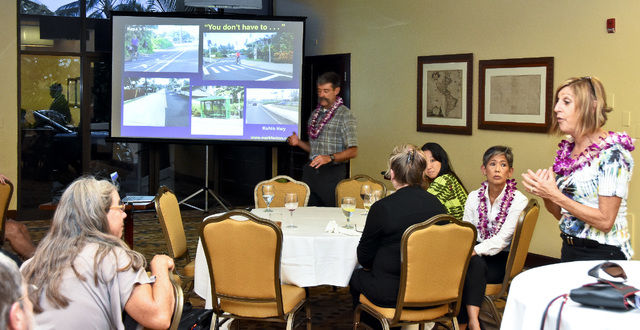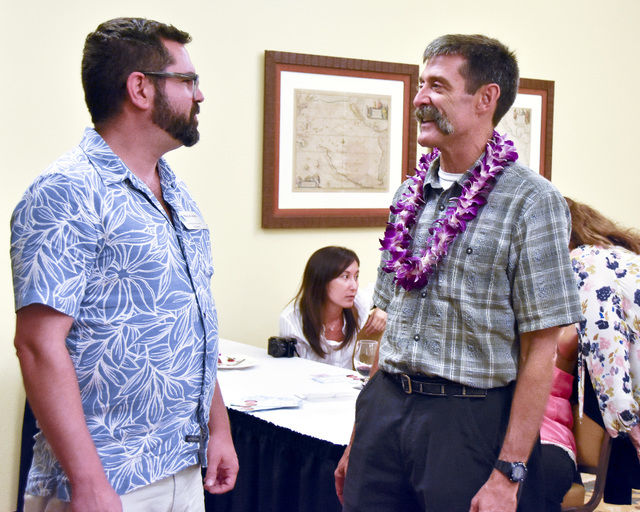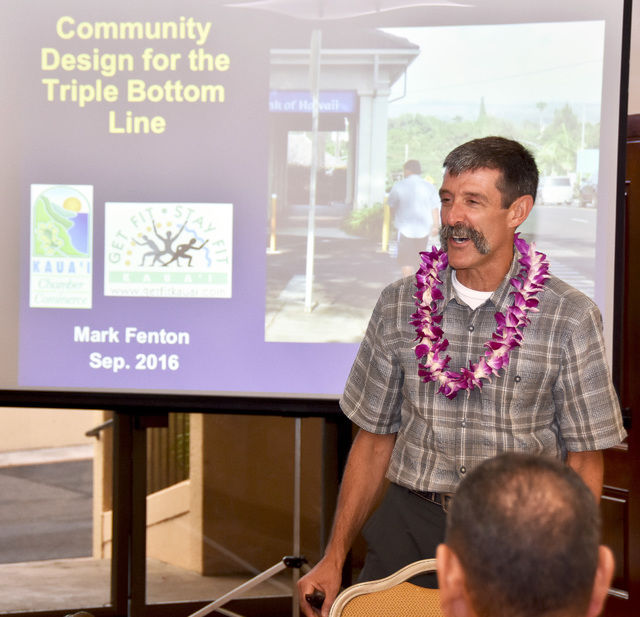WAIPOULI — We should be physically active, but we’re not, said Mark Fenton Wednesday evening during the Kauai Chamber of Commerce and HMSA sponsored presentation at the Courtyard by Marriott at Coconut Beach. Fenton’s presentation walked people through things we
WAIPOULI — We should be physically active, but we’re not, said Mark Fenton Wednesday evening during the Kauai Chamber of Commerce and HMSA sponsored presentation at the Courtyard by Marriott at Coconut Beach.
Fenton’s presentation walked people through things we tend to do to help the economy, environment and people.
Bev Brody of the Hawaii Public Health Institute and Get Fit Kauai, and Heidi Hansen-Smith of the state’s Department of Health approached Mark Perriello of the Kauai Chamber of Commerce to have Fenton talk about the effort to create “healthier” communities by design. Fenton is one of the presenters at the planners convention taking place at the Grand Hyatt Kauai Resort and Spa.
“Mark Fenton, when he came in 2009, he planted the seeds,” Brody said. “We were working with the tobacco settlement money on improving the health of the community. Mark came in and turned our world upside down. He planted the seeds to where Kauai’s Safe Routes to School program is the largest in the state.”
Fenton had more than 40 people think back to their youngest recollection of being physically active.
The act triggered people into action, creating an evening of buzz among the guests as he asked, “Would you consider yourselves as being free range?” driving nearly all of the guests to raise their hands.
“Would you consider your children as being free range?” The response was the other extreme as all hands stayed down.
“That is the root of the chronic condition,” Fenton said. “During the period from 1999 to 2001, the percentage of parents driving their children to school rose nearly double. In that same period, we have seen an increase in obesity.”
That also correlates to the increase in diabetes with younger people showing symptoms of the disease.
The adjunct associate professor at Tufts University’s Friedman School of Nutrition Science and Policy and former host of the “America’s Walking” series on PBS television said people need at least 30 minutes of walking daily (60 minutes for youth). Only 20 percent of Americans meet this criteria which leads to an estimated 365,000 Americans perishing due to physical inactivity and poor nutrition.
Fenton cited four elements which support an ‘active’ transportation system, including a mix of land use, good site design for a pedestrian, bike, and transit network, and safety and access for all.
“He was very good,” said Eva Labarge of Wilcox Hospital. “He explains everything that is happening so it makes sense.”
Addressing the safety aspect, Fenton brought out a picture he took of Rice Street in 2009 where he overlaid plans of reducing the thoroughfare to a three-lane roadway with bike paths and a central turn lane to improve the safety of the road while improving the flow of traffic, his suggestions being accompanied by photos of successful stories from other parts of the mainland.
Walkability also improves house values, Fenton said, noting comparisons in real estate periodicals of homes being rated for walkability and comparing their values in the marketplace.
This also applies to retail spaces where in one extreme example Fenton pointed out a shopping center struggling to survive put on a second level and turned it into housing units, effectively reversing the trend.
“Public well being goes beyond community,” said Elisa Yadao of HMSA. “Kauai has become a beacon in the state for Safe Routes to School. We want to see Kauai continue to be the leader in planning for healthier communities.”




